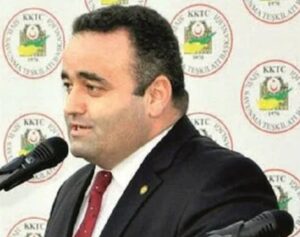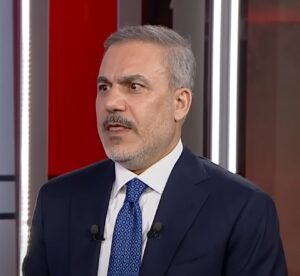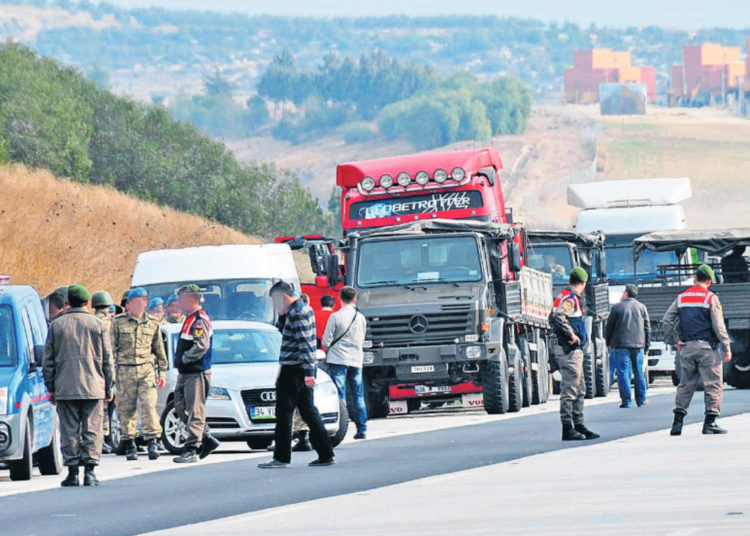Abdullah Bozkurt/Stockholm
The Turkish intelligence agency Milli İstihbarat Teşkilatı (MIT) shipped weapons to the Islamic State in Iraq and Syria (ISIS) from a secret depot it maintained in the southern border town of Reyhanlı, according to explosive court testimony obtained by Nordic Monitor.
During a hearing at the Ankara 4th High Criminal Court on August 5, 2020, retired colonel Fatih Yarımbaş — a former member of Turkey’s elite Special Forces Command (Özel Kuvvetler Komutanlığı, or ÖKK) — told the court that MIT knowingly delivered arms to Syria despite being fully aware they would end up in the hands of ISIS militants.
According to Yarımbaş, the weapons — the origin of which was unclear — were flown into Gaziantep Airport and transported under the cover of darkness by MIT operatives to two secret weapons depots in Reyhanlı. “These weapons are then smuggled into Syria,” he testified. “They [MIT agents] claim the arms are being supplied to the Free Syrian Army [FSA]. But do you know what the FSA does? They have no money. They sell Kalashnikovs to ISIS for $300 apiece. So, are the weapons going to ISIS or not? They are.”
The operation, he claimed, was overseen by MIT’s Special Operations Directorate (Özel Operasyonlar Başkanlığı), headed by senior MIT official Kemal Eskintan, also known among jihadist factions by his alias Abu Furqan. Eskintan has played a pivotal role in facilitating covert Turkish state support to extremist groups not only in Syria but also in other conflict zones across the Middle East and Africa.
Excerpts from the court testimony of Fatih Yarımbaş, a former colonel in Turkey’s elite Special Forces Command:
Although the full extent of Turkey’s weapons transfers to Syrian jihadist groups remains officially undisclosed, a leaked 2014 audio recording suggests the scale was massive. In the recording then-intelligence chief Hakan Fidan is heard discussing military intervention in Syria during a high-level meeting with then-foreign minister Ahmet Davutoğlu.
Fidan said, “If needed, I would dispatch four men to Syria. [Then] I would have them fire eight mortar shells at the Turkish side and create an excuse for war.”
He also confirmed that some 2,000 truckloads of arms had been shipped into Syria — ostensibly under humanitarian cover.
Col. Yarımbaş further testified that ISIS militants were covertly transported into Turkey under the guise of being “moderate opposition fighters” and received medical treatment at Turkish hospitals. He named Brig. Gen. Semih Terzi, deputy commander of the special forces, as one of the few senior military officials who opposed MIT’s clandestine cooperation with jihadist elements.
Terzi was aware of MIT’s illicit dealings and rejected efforts by ÖKK commander Lt. Gen. Zekai Aksakallı to deepen collaboration with MIT in Syria. Terzi resisted the policy of training and arming extremists, which aimed to draw Turkey deeper into the Syrian civil war.
According to Yarımbaş, this policy disagreement culminated in Terzi’s assassination during a coup attempt in 2016 orchestrated by MIT. The goal of the false flag operation was to consolidate the power of President Recep Tayyip Erdogan, crack down on opposition groups, especially the Gülen movement, and pave the way for Turkish military intervention in northern Syria.

In 2021 Nordic Monitor published a leaked internal police intelligence memo revealing how the mastermind behind some of the deadliest ISIS terrorist attacks in Turkey had been working with MIT.
The suspect, İlhami Balı, known by his nom de guerre Abu Bakr (Ebu Bekir), was indicted for planning numerous ISIS operations in 2015, including twin suicide bombings in Ankara that killed over 100 people. Despite being wanted on multiple arrest warrants, Balı met secretly with MIT agents in Ankara in 2016, according to the memo.
Police discovered that Balı stayed for three days, between May 27 and 29, 2016, at the newly opened five-star Söğütözü Anadolu Hotel — his stay fully arranged and protected by MIT. For security reasons Balı was initially confined to his hotel room under the watch of MIT agents Serhan Albayrak (a contract operative on the Syria desk) and Ahmet Özçelik (a translator from the Iraq desk).

The memo details how Balı disguised himself by shaving his beard and dressing in casual clothing — jeans and a T-shirt — to avoid recognition. During his stay he held meetings with İlhan Kaya, MIT’s station chief in Erbil who now oversees the agency’s special operations, as well as other personnel from the Syria desk.
Despite MIT’s foreknowledge of many ISIS plots inside Turkey, the agency took no action to prevent deadly attacks. This inaction, combined with judicial leniency, has helped ensure that few ISIS operatives face meaningful consequences.
Although Turkish authorities frequently report the number of ISIS-related detentions, they rarely provide figures on actual convictions. Most ISIS suspects are released after brief interrogations or are let go during trial proceedings. Convictions, when they occur, are limited and often lenient.
This is widely seen as a reflection of the Erdogan government’s permissive attitude toward ISIS. The Turkish judiciary has consistently failed to hold ISIS operatives accountable. Even parliamentary efforts to determine how many convicted ISIS members are currently serving time in Turkish prisons have been stonewalled by the government, which cites “national security” concerns as justification for refusing disclosure.













